Skyliners
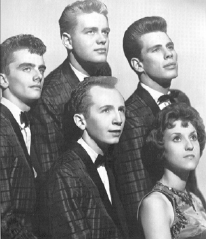
Clockwise from top: Joe Vershcharen, Jimmy Beaumont,
Janet Vogel, Jack Taylor, Wally Lester
Put together the harmonies of the best 50s R&B groups and mix
them with the Four Freshman, the result would be the Skyliners
Members:
Jimmy Beaumont - lead
Janet Vogel - first tenor
Wally Lester - second tenor
Joe Verscharen - baritone
Joe Taylor - bass
This Pittsburgh vocal group made a magnificent
heartache ballad in 1959, "Since I Don't Have You." It
remains among R&B's ultimate agonizing triumphs, and Chuck
Jackson later did an equally gripping version. Jimmy Beaumont was
the lead vocalist, with Janet Vogel, Wally Lester, Joe
VerScharen, And Jackie Taylor. Beaumont, Taylor, and Lester had
been in The Crescents, while Vogel and VerScharen were alumni of
The El Rios. Their follow-up, "This I Swear," was a
creditable effort that peaked at number 20 on the R&B charts,
but few remember it. Oddly, "Since I Don't Have You"
only reached number three on the R&B side and number 12 on
the pop charts. But it's certainly one song for whom the numbers
really don't come close to telling the story. The Skyliners had
two chart singles on Callico and then had one other song reach
the R&B Top 40 in 1965, "The Loser," for Jubilee. ~
Ron Wynn, All-Music Guide
The Skyliners were into the Vocal
Group Hall of Fame in 2002
Janet Vogel committed suicide February 21, 1980,
she was 37.
Joe Verscharen died of cancer November 2 2007, he was 67.
Wally Lester died of pancreatic cancer April 21, 2015, he was 73.
Jimmy Beaumont died October 7, 2017, he was 76.
Shep
and the Limelites
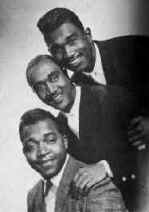
From the top: Charles Baskerville,
Clarence Bassett, James "Shep" Shepard
After singing lead with the Heartbeats from 1956 until
around 1958,Sheppard decided tp form another group in 1961.
The group had a unique sound as they didn't have a bass singer
but instead relied on two-part harmony and blending of voices.
Members:
James "Shep" Sheppard - lead
Clarence Bassett - first
tenor
Charles Baskerville - second tenor
Artist Biography by Andrew Hamilton
Shep & the Limelites' name will forever be
etched in rock & roll history for recording the endearing
"Daddy's Home," a tender ballad about returning from
war that soared to number two on the pop charts in May 1961.
James Sheppard's career began with the Heartbeats, a band from
Jamaica, Queens, NY. (They were the Hearts until a female group
from Harlem with the same name scored a minor hit called
"Lonely Nights" in early 1955.) The Hearts would mimic
songs by the Orioles, the Ravens, Five Keys, the Moonglows, the
Larks, the Flamingos, and others. When not rehearsing, they
competed with wannabes in parks and under street corner lamps.
During one encounter they battled a group led by James Sheppard;
impressed, the Hearts asked Sheppard to be their new lead.
The acquisition of Sheppard helped the Hearts twofold: not only
could he blow, he also wrote gorgeous ballads. Shortly after he
joined the Hearts, they became the Heartbeat Quintet and started
playing clubs, weddings, graduations, ceremonies, and basement
parties. Jazz saxophonist Illinois Jacquet befriended them and
let them rehearse in his basement. Jacquet's brother arranged
their first recording opportunity. "Tormented," a
ballad written by Sheppard, was released on Network Records in
Philadelphia, but lack of promotion killed any chance of success.
After shortening their name to the Heartbeats, they came to the
attention of William Miller, who worked for Hull Records. He
introduced the quintet to owner Bea Caslin, who was impressed by
their tight harmonies and Sheppard's songwriting skills; the
group was soon signed to the label. Three initial releases sold
well, particularly the magnificent "Your Way"; all were
ballads written by Sheppard.
The minor successes of the recordings encouraged Hull Records to
invest in professional choreography to tighten the band's stage
presentation. Appearances at premier New York venues like the
Brooklyn Fox and the Apollo had become common. To the surprise of
Hull Records, fans called radio stations in record numbers
demanding to hear the flip of "Baby Don't Go," the
exquisite "A Thousand Miles Away." Sheppard's craving
for an ex-girlfriend who moved to Texas had inspired "A
Thousand." Not only did the song do well locally and
regionally, it started selling nationwide. Bookings poured in,
providing appearances with luminaries like Ray Charles, B.B.
King, and the Flamingos. Touring, however, didn't prove
lucrative, as they experienced an inordinate share of misfortunes
including vehicle breakdowns and promoters leaving with the
proceeds. "Daddy's Home" would be the Heartbeats' final
Hull Record release.
Bea Caslin then sold the Heartbeats' contract and the publishing
rights to the Roulette Record conglomerate. "I Won't Be the
Fool Anymore" came out on Rama Records in 1957; after
another Rama release, Roulette switched them to Gee Records, and
eventually to Roulette itself. "500 Miles to Go" and
"After New Year's Eve" were the most successful
commercially, while "Down on My Knees" was the most
notable artistically.
Problems within the group began to show: the last straw came when
Sheppard passed out at the microphone in Philadelphia, and
bandmate Al Crump sang the lyrics until Sheppard was able to
continue. The group wanted to breakup after this embarrassment
but had commitments, so the group sang on gigs as a quartet doing
standards, and Sheppard appeared afterward to sing the Heartbeat
hits. They did their last gig in 1959 at the Howard Theater in
Washington, D.C., and Sheppard opened a restaurant in Jamaica,
Queens, singing solo on the side.
Two years after the the Heartbeats' demise, Sheppard met some old
friends -- Clarence Bassett and Charles Baskerville of the Videos
-- and formed Shep & the Limelites. Bassett had also warbled
with the Five Sharps. After two flops on Apt. Records, Shep
returned to Hull Records and Caslin signed them on the spot.
"Daddy's Home" was Shep & the Limelites' first Hull
release and it nearly aced the pop chart, stopping at number two.
(Ricky Nelson's "Travelin' Man" kept it from the top
spot.) Hull released 12 Shep & the Limelites singles between
1961 and 1965. "Our Anniversary" went to number seven
R&B in 1962 and was their only other chart success. Personal
differences caused the Limelites to disband by 1966. Baskervlle
joined the Players, and Bassett sang with the Flamingos and later
Creative Funk. Sheppard reunited with the Limelites in 1970 to
perform on the oldie revival circuit, but this quickly ended when
Sheppard was found on January 24,
1970, shot to death in his car on the Long Island expressway.
Students

Back Row: left to right: Ralph Byrd and Leroy King
Front Row: left to right: Roy Ford, Richard Johnson, Dorsey
Porter and John Bolden
Members:
Leroy King (lead)
Dorsey Porter (First Tenor)
Roy Ford (Second Tenor)
John Bolden (Baritone)
Richard Johnson (Bass)
Ralph Byrd (Guitar)
The Students were a vocal group from Cincinnati,
Ohio. Their recordings were backed by the Jimmy Coe band
which included guitar great, Wes Montgomery. The groups
hits, "I'm So Young" and "Every Day Of The
Week" were written by William H. “Prez’
Tyus. He gave the songs to a local group called the
D’Italians. They were signed by Chess Records and
changed their name to The Students.
On May 29, 1961 The Students charted their only national
hit record, "I'm So Young" on Argo Records.
The single became a big R&B hit on the Billboard R&B
singles chart, as it reached #26. The flip side of the
single is another great doo-wop favorite "Every Day Of The
Week", it failed to chart but became a favorite with their
fans and radio DJ’s of the day. Then back on the road.
In 1961 their single was re-released, through the
efforts of legendary Slim Rose, owner of Times Square Records,
one of the most famous record shops in the world.
Later in 1962 the group re-released another single record,
"My Vow To You" "That's How I Feel" but
neither side charted and following that The Students
disbanded. In 1964 Roy Ford one of the original Students
met Johnny Mannino while in the military. They re-formed
the group, performing in many top venues across the country.
Lewis Lymon and the Teenchords
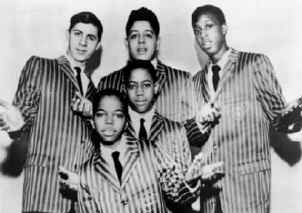
(top l to r) Lyndon Harold, Rossilio
Rocca, David Little
(second row center) Ralph Vaughan
(front) Lewis Lymon
Lewis Lymon was Frankie's little brother, who with neighborhood
friends started singing in 1956
Members:
Lewis Lymon - lead
Ralph Vaughan - first tenor
Rossilio Rocca - second tenor
Lyndon Harold - baritone
David Little - bass
Artist Biography by Jim Dunn
Following in the footsteps of his older brother, the legendary
Frankie Lymon, Lewis Lymon also made an attempt at rock &
roll stardom. And though his group, the Teenchords, never enjoyed
the level of success achieved by Frankie's Teenagers, they still
carved out a significant niche for themselves in the ranks of
1950s rock & roll vocal groups.
The Lymon family was a musical one, with the father, Howard Lymon
singing in a local gospel group, the Harlemaires. Lewis had
previously sung with the Harlemaires Juniors along with brothers
Frankie and Howard Jr.. And in 1956, with the success the
Teenagers were having, it was not surprising that Lewis wanted to
take a stab at it too. The Harlem-based Teenchords even had a
similar-sounding name to the pace-setting Teenagers. The group
consisted of Lewis Lymon (lead), Ralph Vaughan (first tenor),
Rossilio Rocca (second tenor), Lyndon Harold (baritone), and
David Little (bass).
The Teenchords didn't even have to leave Harlem to be discovered
and recorded. On a visit to the Apollo to hear the Teenagers,
Lewis and his group were tipped off that local entrepreneur Bobby
Robinson was looking for new talent. Robinson owned a record
store in Harlem and was also a record producer who had already
started two record labels, Red Robin and Whirlin' Disc. The
fledgling Teenchords group went to Robinson's shop and introduced
themselves. When Robinson learned that Frankie Lymon's brother,
Lewis, was in the group, he was quite receptive to an on-the-spot
audition. The Teenchords performed "Who Can Explain," a
Teenagers song. Convinced that the young lads could sing, and
with the Lymon name to go along with it, Robinson signed the
Teenchords on the spot.
For their first recording, Robinson tried to come up with
something that would be catchy and appealing to a teenage
audience. First he came up with a vocal riff. He had the group
keep singing ad nauseum, until finally he came up with suitable
lyrics to go with it. And so "I'm So Happy" was born.
The flip side, "Lydia," was penned by Lymon and relates
to a girl he knew from his neighborhood. The tunes were issued on
Robinson's newly formed Fury label and released in late 1956. The
record never charted nationally, but had respectable East Coast
sales. In a January 1957 trade ad, Robinson boasted the disc had
sold 40,000 copies in its first ten days in the New York,
Philadelphia, and Boston markets. In fact, four years later, in
1961, a young record producer named Phil Spector would cover the
record with a group called the Ducanes. The Teenchords' second
record, and perhaps their best two-sider, was released in March
of 1957. It paired the up-tempo "Honey, Honey" with a
nice ballad, "Please Tell the Angels."
The Teenchords maintained an active performance schedule. They
returned to the Apollo, but this time as performers rather than
fans, and also appeared at the Paramount on an Alan Freed
extravaganza. A June 1957 press release announced that the
Teenchords would be featured in a new film, "The Hit
Record," along with a bevy of other rock & roll acts.
When the film made it to the screen, the title had been changed
to Jamboree. The group's last Fury release, also in 1957, was
"I'm Not Too Young to Fall in Love" backed with
"Falling in Love."
Apparently the Teenchords had fallen out of love with Bobby
Robinson. They had supposedly been signed to a two-year contract
with Robinson, but by September 1957 George Goldner was
announcing that he had signed the Teenchords to his End label,
although it appears that there was never an official contract
signed. The label move came on the heels of a tour the Teenchords
had made in the British West Indies with the Bullmoose Jackson
Orchestra. Their first End waxing of "Too Young" paired
with "Your Last Chance" received excellent ratings from
Billboard. You can see the Teenchords perform "Your Last
Chance" in the Jamboree motion picture. But, like their Fury
recordings, their End releases would also not chart nationally.
Their second and last End recording matched "Tell Me
Love" with "I Found Out Why," which was a
lackluster answer song to the Teenagers' "Why Do Fools Fall
in Love." Both sides received very good ratings from
Billboard. Spurred by a demand for "oldies" in the
early '60s, Goldner reissued "Too Young," this time
paired with "I Found Out Why" in 1962.
When two of the Teenchords, Little and Harold, were discovered in
a stolen automobile, the fate of the group was all but sealed.
Mrs. Lymon would not allow her son to continue singing with the
contingent. Some personnel changes were made, but shortly
thereafter the group had disbanded. As the group's swan song,
Goldner released a single on his Juanita label. "Dance
Girl" backed with "Them There Eyes" came out in
1958 with little fanfare. Although the Teenchords were the first
to record the Les Cooper-authored "Dance Girl," it had
also been given to another group, the Charts. The Charts' version
on Everlast beat the Teenchords to market and garnered most of
the sales. Les Cooper & the Soul Rockers would have a hit in
1962 with the instrumental "Wiggle Wobble," and his
Soul Rockers group included former Charts member Joe Grier on
sax.
Following the breakup of the Teenchords, Lewis Lymon went on to
record one more record as part of the Townsmen. Issued in 1961 on
the PJ label, "I Can't Go On" had Lewis on lead. The
flip side, "That's All I'll Ever Need," had Louis
Vasquez handling the lead vocal chores. The other members of the
Townsmen were Ralph Ramos and McDuffy Swaggart. The record
became an instant obscurity. A tour of duty in the armed forces
in the early to mid-'60s removed Lewis from the music scene. By
the time of his return, America had experienced the British
Invasion and the shape of teenage rock & roll had changed
dramatically from the heyday of doo wop.
In the early '70s, when another "oldies" revival was
sweeping the Northeast, Lewis re-formed the Teenchords and played
at a number of venues. In the years since then, he has at times
performed with other aggregations of the Teenchords. In 2003, he
performed as a member of Frankie Lymon's Teenagers with original
members Jimmy Merchant and Herman Santiago. Louie Lymon & the
Teenchords' End and Fury recordings are available on a CD issued
by Relic Record
Linc-Tones/Tokens
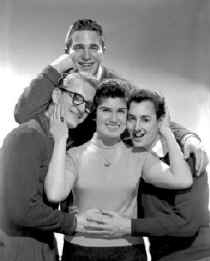
Top: Eddie Rabkin
Bottom L to R: Henry Medress, Cynthia Zolotin, Neil
Sedaka
|
Tokens/Tradewinds
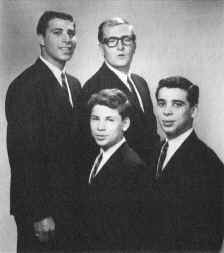
Top left clockwise:
Jay Siegal, Hank Medress, Michael Margo,
Phil Margo
|
Members - Linc-Tones
Hank Medress
Cynthia Zolotin
Neil Sedaka
Eddie Rabkin |
Members - Tokens/Tradewinds
Hank Medress - 2nd tenor -bass and
piano
Jay Siegal - lead singer -guitar
Michael Margo - 1st tenor - piano and
drums
Philip Margo - baritone - piano,
drums, guitar |
|
In 1955, Neil Sedaka was sitting in his math
class at Lincoln High School when he heard Jay Siegel singing
Falsetto. They decided to form a group and recruited three
members of Mrs. Eisen's Choral (Hank Medress, Cynthia Zolotin and
Eddie Rabkin), the Linc-Tones Was Born. Piano prodigy Sedaka
decided The Tokens sounded better as a name; Rabkin left the
following year and was replaced by Siegel. Cynthia's family had
connections in the city at the Brill Building, which opened
doors for her and Neil.
The quartet auditioned for Morty Craft, owner of the Willows'
label, Melba, and recorded "I Love My Baby" (with a
lead vocal by Rabkin) backed with "While I Dream" (lead
by Sedaka), both written by Neil and another Lincoln High
student, Howard Greenfield. This led to an appearance on Ted
Steele's Teen Bandstand show on WOR-TV, though the single didn't
catch on outside the N.Y. area. The group gradually separated and
in '58 Hank and Jay ventured forth with Warren Schwartz and Fred
Kalkstein as the oddly-named Darrell and the Oxfords; two 1959
singles on Roulette included the ballad "Picture in My
Wallet." Late in the year another shake-up occurred when
Hank and Jay began singing with younger Lincoln High student Phil
Margo, who played piano, and his 12-year-old brother Mitch. They
came up with another strange name, Those Guys, then in 1960 Joe
Venneri joined and the group functioned as a quintet for several
years. Craft signed them again, this time for the Warwick label,
insisting they ditch that "Those Guys" misnomer.
Reviving the Tokens name, they hit the top 20 in the spring of
'61 with a catchy 'doo-be-doo-be-dum...' tune penned by Margo and
Medress, "Tonight I Fell in Love."
The Tokens are an American male doo-wop-style
vocal group and record production company group from Brooklyn,
New York. They are known best for their chart-topping 1961
single, "The Lion Sleeps Tonight"
The group was formed in 1955 at Brooklyn's Abraham Lincoln High
School, and was known first as The Linc-Tones. Originally
featuring members Neil Sedaka, Hank Medress, Eddie Rabkin, and
Cynthia Zolotin, Rabkin was replaced by Jay Siegel in 1956, and
the band recorded its first single, "While I Dream"
that same year. In 1957 Sedaka and Zolotin left the band, leaving
only Siegel and Medress, who would recruit two additional band
members and record the single "Picture in My Wallet" as
Darrell & the Oxfords. Finally establishing its most famous
name and crew, the band became known as the Tokens in 1960 after
they recruited the 13-year-old multi-instrumentalist and first
tenor Mitch Margo and his baritone brother Phil Margo.
In early 1961, the Tokens released a single for Warwick Records
titled "Tonight I Fell In Love," which scored No. 15 on
the Billboard Hot 100 chart and earned the group an opportunity
to perform on the television program American Bandstand. The
popularity that the band garnered as a result of this performance
brought it new recording opportunities, culminating in its cover
of Solomon Linda's "The Lion Sleeps Tonight" for RCA
Victor Records. It reached No. 1 on the Billboard Hot 100 chart,
where it remained for three weeks. The same track peaked at No.
11 in the UK Singles Chart. Both "Tonight I Fell in
Love" and "The Lion Sleeps Tonight" sold more than
1 million copies, and were awarded gold discs.
From 1962 to 1970, the group released nine more songs that scored
the Top 100. Jay Siegel was the lead vocalist on all the Tokens'
hits including "I Hear Trumpets Blow" (1966) and
"Portrait of My Love" (1967). Beginning in 1963, The
Tokens also began serving as record producers for other artists,
such as the Chiffons, Randy & the Rainbows and the
Happenings. Their production company was called Bright Tunes and
they also created their own record company, B.T. (Bright Tunes)
Puppy Records. In 1972, Jay Siegel did background vocals for a
re-recording of Lion Sleeps Tonight with Robert John as the lead
vocalist. This version hit #3 on the charts, and was awarded a
Gold disc.
In 1970, Hank Medress began producing an act for Bell Records,
Dawn, which featured the former teen-idol Tony Orlando. It was as
a favor to Medress that Orlando sang the lead on the first
record, "Candida", which became a Top 3 hit.
In 1973, Medress ended his relationship with the group and Siegel
teamed with the Margo Brothers to form the group Cross Country,
which would have some success with its cover version of "In
the Midnight Hour." The Tokens reunited during 1975 for
occasional weeks as singing regulars on the Adam Wade hosted game
show Musical Chairs and in 1978 recorded a song for ABC's
Schoolhouse Rock named "A Victim of Gravity".
Brothers Mitch and Philip Margo continue to perform with new
members Jay Leslie, Mike Johnson and Noah Margo (one of Margo's
sons) playing drums. Mitch Margo's sons, Damien Margo and Ari
Margo, also make occasional guest performances with the band,
exemplifying Phil Margo's saying that "If you hang around
long enough you can grow your own band."
Siegel continues to perform with his own version of The Tokens as
well, featuring bass singer Bill Reid and, more recently, John
"Jay" Traynor, the original lead singer (before Jay
Black) of Jay & the Americans and the Mystics. Siegel's son
is also part of the group as keyboardist and occasional vocalist.
(John "Jay" Traynor died January 2, 2014, of liver
cancer at a hospital in Tampa, Florida.
Jay Siegel's Tokens and the Margo brothers reunited in 2000 to
perform on the PBS special, Doo Wop 51. At the time, Siegel's
Tokens were Siegel, Reid and Eddy Rezzonico; Rezzonico had
replaced Richie Grasso during the 1990s.
Hank Medress died of lung cancer June 18, 2007,
he was 68.
Jay Traynor died January 2, 2004 of liver cancer, he was 70.
Mitch Margo died of natural causes November 24, 2017
at the age of 70.
Phil Margo died of a stroke November 13, 2021, he was 79.
The
Turbans
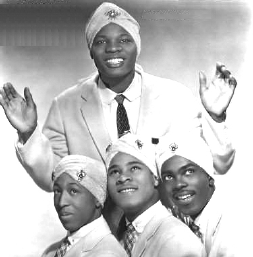
Top: Andrew Jones
Botom L to R: Charlie Williams, Matthew Platt, Al Banks
The Turbans turned a mambo rhythm into a rock and roll standard
Members:
Al Banks - lead
Matthew Platt - tenor
Charlie Williams - baritone
Andrew Jones - bass
Decked out in their trademark headgear, The
Turbans scorched the R&B charts in 1955 with "When You
Dance." This teenage quartet from Philadelphia signed with
Al Silver's Herald imprint. They debuted with the Latin-beat
classic "When You Dance," with Al Banks's (b Jul 26,
1937) high-flying falsetto prominent. "Sister Sookey"
was a worthy upbeat follow-up for the group in early 1956 but
failed to chart, and three more fine 1956-1958 outings on Herald
met the same undeserved fate. The Turbans went on to record for
Imperial and Roulette, with no tangible results. Banks later
worked with one of the leading groups of Drifters populating the
70s lounge circuit before his death. ~ Bill Dahl, All-Music Guide
Al Banks died July, 1977.
Andrew Jones died June 25, 1998.
Dreamers/Valentines
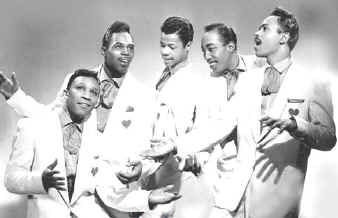
(l - r) Mickey Francis, Eddie Edgehill,
Ronnie Bright, Raymond Briggs, Richard Barrett
The group never had a national hit yet it is known among
lovers of 50s rhythm and blues
Members: - Dreamers - 1952-1953
Carl Hogan - lead
Mickey Francis - baritone
Ray Briggs - 1st tenor
Ronnie Bright - bass
Richard Barrett -lead |
Members - Valentines
Richard Barrett - lead
Mickey Francis - 1st tenor
Eddy Edgehill - 2nd tenor replaced by
Carl Hogan in 1957
Ray Briggs - relaced by David Clowney
in 1956
Ronnie Bright |
|
Artist Biography by Bryan Thomas
The Valentines never really had any R&B or pop hits on the
national charts to speak of, but are probably best known for
serving as a launching pad for a few important careers,
especially that of Richard Barrett, one of the greatest A&R
men of all-time.
Barrett originally started out as a performer for the
Philadelphia-based group the Angels (not to be confused with the
group who had the 1963 number one hit, "My Boyfriend's
Back"). The group broke up before they had a chance to
record. He later moved to Harlem, and in 1952, met Raymond
"Pop" Briggs (tenor), Carl Hogan (second tenor), Mickey
Francis (first tenor and lead), and Ronnie Bright (bass). They
were a young black vocal group calling themselves the Dreamers at
the time and could be found on the street corners in the
Sugarhill section of town (aka Washington Heights) or at the park
across from the Polo Grounds.
Barrett took the lead vocals on some of their material, including
his own composition, "Summer Love." They decided to
change the name of their group to the Valentines, which came
courtesy of Francis' fondness for "My Funny Valentine."
Soon they had developed a sound that was musically similar to
what the Cadillacs, the Solitaires, and the Flamingos were doing.
Raoul Cita, pianist for the Harptones, liked what he heard and
introduced them to Bruce Monte of Bruce Records, who recorded
demos but failed to release anything. By 1954, however, the
Valentines were beating local acts in vocal competitions and
performing at the Apollo Theatre's Amateur Night contest. Donald
Razor (the Velvets) came in to replace Eddie Hogan next and this
lineup paid a visit to Hy Weiss, who ran Old Town Records out of
the cloakroom of the Triboro Theatre on 125th Street and 3rd
Avenue in Harlem. Weiss signed them and issued Barrett's
"Summer Love" in December 1954. Unfortunately, the
single went unnoticed at the time.
Eddie Edgehill soon came aboard as second tenor. They next
auditioned for George Goldner's Rama label (which he'd formed a
few years earlier). Goldner told Barrett he wasn't one-hundred
percent sold on them, but encouraged Barrett to keep in touch and
inform him about other groups. As it turned out, Barrett had a a
natural knack for discovering talent; in the spring of 1955,
Barrett brought him the "teenie" group led by
12-year-old Frankie Lymon. The group soon had a massive hit on
their hands with Barrett's "Why Do Fools Fall in Love"
under their original name: Frankie Lymon & the Teenagers.
Soon, the Valentines' Barrett was approaching Goldner about
releasing a song by his own group, "Lily Maebelle,"
which was issued on the Rama imprint in September 1955, becoming
an East Coast favorite and earning them a spot on the bill of a
few of Alan Freed's shows at the Academy of Music and Brooklyn
Paramount. The Valentines had, by this time, developed into
debonair dancers and appeared nattily dressed on stage in their
matching white jackets with red valentines on the pockets, red
shirts, black shoes, and pink bowties. Their sold-out shows at
Paramount, Apollo Theater, Howard Theater, and Royal Theaters,
some hosted by disc jockeys Hal Jackson and Jocko Henderson,
became the talk of the town.
The Valentines' "Christmas Prayer" was issued next, but
failed to arouse much interest. Meanwhile, Barrett began working
with the Cleftones, five friends from Jamaica High School in
Queens. Their next two singles were huge hits. Barrett's
Valentines, unfortunately, didn't have the same Midas touch;
their next single, "Woo Woo Train," quickly became a
favorite of Alan Freed's, but didn't chart.
Sometime during 1956, the Valentines went through another
personnel change. David Clowney (the Pearls) replaced Briggs and
Carl Hogan -- who had been singing with the Miracles (the
original group on Fury; this was a year before Smokey Robinson's
group recorded under this name) -- rejoined for what turned out
to be their final recording session for Rama. The Valentines also
sang with the Wrens on "C'est La Vie" and recorded a
radio promotional song for Boston disc jockey Joe Smith, who
later went on to become head of Warner Bros. Records.
Barrett continued working with Goldner's Rama and Gee labels,
becoming the creative force behind many of the groups signed by
Goldner during the mid- to late '50s (including the Chantels, one
of the very first R&B girl groups to have nationwide
success). Barrett eventually decided to devote his full attention
to the Chantels and dissolved the Valentines during the summer of
1957, after one final appearance at the Apollo. He later worked
with Little Anthony & the Imperials and even re-formed the
Chantels in 1959, taking over lead vocal duties. Their
re-recording of "Summer's Love" later charted at number
93 pop and number 29 R&B and subsequent singles also charted
high on the charts. In 1960, Barrett left Goldner's empire and
started his own label, signing the Veneers.
In 1963, Barrett returned to his native Philadelphia and began
his long association with the Three Degrees, a local vocal girl
group who later had huge R&B hits in the '70s with songs
written by Barrett. He later got them short-term deals with
Warner Bros., Metromedia, and Philadelphia's Kenny Gamble and
Leon Huff's Neptune label and they scored again after doing the
vocals for TV's "Soul Train" theme song, "TSOP
(The Sound of Philadelphia)" by MFSB featuring the Three
Degrees, hitting number one R&B and number one pop in 1974.
This lead to other hits and TV appearances
Willows
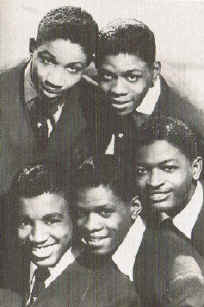
Clockwise from top left: John Thomas
Steele, Ralph Martin, Richie Davis, Joe Martin, Tony Middleton
The Willows from Harlem were idols and inspirations to many from
the neighborhood that followed like The Harptones, The Fire
Crowns and The Bop Chords
Members:
Tony Middleton - lead
Richie Davis - first tenor
Ralph Martin - second tenor
Joe Martin - baritone
John Steele - bass
Artist Biography by Andrew Hamilton The Willows
bloomed in 1950 from Harlem as the Dovers: Richie Davis, John
Steele, Ralph Martin, Joe Martin (twins), and Bobby Robinson.
Tony Middleton replaced Robinson who left in 1952 to open a
record shop on 125th Street that became Fury Records.
The Dovers built a reputation battling other groups; they often
practiced with Gloria Lynne's group, the Delltones; Lynne later
recorded on Premium with the Wheels before going solo. Pete and
Goldie Doraine became their managers and financed the groups'
1953 debut, "Love Bells," on their own Pee Dee label,
as the Five Willows. Three singles followed on Allen Records in
1953 that balm egos but did nothing for their bank accounts.
After two flops on Herald in 1954, they hit as the Willows
(dropping the "Five" for booking purposes) on Melba in
1956 with "Church Bells May Ring," featuring Neil
Sedaka on chimes. It blasted to number 11 R&B but died at
number 62 pop due to the Diamonds' number 14 pop cover. The
Cadets and Sunny Gale also played the cover game.
They didn't have any more hits but hung tough until 1965.
Platters on Eldorado and Gone in 1957-1958 credited to Tony
Middleton & the Willows went unnoticed; ditto for singles as
the Willows on Club and Warwick Records. The Martin twins,
Freddie Donovan, and Dotty Martin (Joe's wife) were the Willows
for two nonstarters on Heidi Records in 1964. And a lineup
featuring Tony Middleton and Richie Davis appeared in the '70s to
work the doo-wop revivals; but by the '90s, the Willows wept no
more.
David Middleton died on February 7, 2024 at the
age of 89.
Gladiolas/Zodiacs
Gladiolas
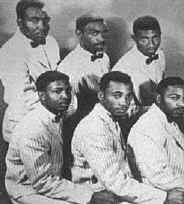
Maurice Williams front row center
|
Maurice
Williams and the Zodiacs
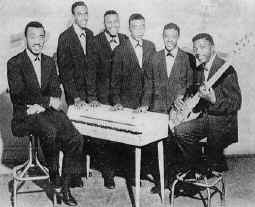
L to R: Maurice Williams, Wiley
Bennett, Shane Gaston, Charles Thomas, Willie Morrow,
Albert Hill
|
Members:
Maurice Williams - lead
Earl Gainey - tenor
William Massey - tenor/baritone
Willie Jones - baritone
Norman Wade - bass
The group first got together while in high school
and would later find work singing on a Saturday morning radio
show.
Williams contacted Excello Records in Nashville
and got the group an audition. Excello liked them, signed
them a named them the Gladiolas. A self-contained group the, both
singing and playing instruments.
When the group left Excello, they agreed not to
use their name again and changed it to the Zodiacs before
signing with Herald Records.
Although Maurice Williams & the Zodiacs only
had one big hit, the song became one of the classic singles in
the history of rock & roll and R&B. The song,
"Stay," was a number one hit upon its release in 1960.
Williams and the Zodiacs' career didn't prove to be as popular as
the song itself. They only had two more minor pop hits before
they disappeared from the charts, but over the course of the next
three decades "Stay" remained one of the most popular
songs of the era and it was played constantly on oldies radio
station. "Stay" was covered by numerous other artists
and has enjoyed a few revivals in mass popularity, most notably
when it was featured in the hit 1987 film, Dirty Dancing.
All-Music Guide
Maurice Williams and the Zodiacs were inducted
into the Vocal
Group Hall of Fame in 2007











